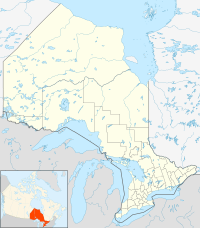Lac Seul First Nation facts for kids
Quick facts for kids
Lac Seul 28
Obishikokaang
|
|
|---|---|
| Lac Seul Indian Reserve No. 28 | |
| Country | |
| Province | |
| District | Kenora |
| First Nation | Lac Seul |
| Area | |
| • Land | 239.09 km2 (92.31 sq mi) |
| Population
(2011)
|
|
| • Total | 872 |
| • Density | 3.6/km2 (9/sq mi) |
| Website | lacseul.firstnation.ca |
The Lac Seul First Nation is a community of Ojibwe people. They are one of the many First Nations groups in Canada. This community is located on the southeastern shores of Lac Seul. This is about 56 kilometers (35 miles) northeast of Dryden, Ontario.
The Lac Seul First Nation is part of Treaty 3. This is an agreement between the First Nations and the Canadian government. They are also a member of the Independent First Nations Alliance. This group helps different First Nations work together. They are also part of the Nishnawbe Aski Nation.
In April 2008, there were 2,837 people registered with Lac Seul First Nation. About 774 of these people lived on their reserve. The reserve is called Lac Seul 28 Indian reserve. Its name in the Anishinaabe language is Obishikokaang. The reserve covers about 26,821.5 hectares (103.56 square miles).
The reserve has three main settlements. Frenchmen's Head is easy to reach by road. It is about 40 kilometers (25 miles) from Sioux Lookout. Whitefish Bay can also be reached by road. It is about 50 kilometers (31 miles) from Sioux Lookout. Kejick Bay is about 60 kilometers (37 miles) northwest of Sioux Lookout. You can get there by road, boat, or plane.
Frenchmen's Head and Kejick Bay each have about 400 people. Whitefish Bay has about 100 people.
In 1929, a company called Ontario Hydro built a dam. This dam was at Ear Falls. Its purpose was to control the water level of Lac Seul. This helped them make hydroelectricity. When the lake became a reservoir, the area known as Kejick Bay became an island. This separated it from the mainland. The island kept the name Kejick Bay. The part on the mainland became Whitefish Bay.
The Lac Seul Indian reserve is surrounded by the Unorganized Kenora District. However, its southeast side touches the town of Sioux Lookout.
Contents
What's in a Name?
The name Lac Seul is French. It might be a mistake in translation from the Ojibwe name Obishikokaang. Some people think Obishikokaang sounds like Obezhigokaang. This could mean "Sole Abundance."
The true meaning of Obishikokaang is not fully known. A common idea is "Narrows [Abundant] with White Pine." It could also mean "White Pine Narrows." In the Ojibwe language, this would usually be something like Obaazhingwaakokaang.
How the Community is Led
The Lac Seul First Nation is led by a chief and council members. They make decisions for the community. Here are the current leaders:
Chief
Clifford Bull
Frenchman’s Head Council
- Samantha Kejick
- Elvis Trout
- Raymond Angeconeb
- Clayton Littledeer
Kejick Bay Council
- Derek Maud
- Stan Littledeer
- Gerald Kejick
Whitefish Bay Council
- Wade Bull
Community Settlements
The Lac Seul First Nation includes several settlements. Some are historical, and others are where people live today.
- Canoe River, Ontario: This was a historical settlement. Its residents later moved to Kejick Bay.
- Frenchmen's Head, Ontario (Wemitigoozhiiwitigwaaning): One of the main communities on the reserve.
- Kejick Bay, Ontario: Another important community, partly on an island.
- Whitefish Bay, Ontario: A community that was once part of Kejick Bay.
- Hudson, Kenora District: This is a nearby town. Many people registered with Lac Seul First Nation live here.
People You Should Know
Many talented people come from the Lac Seul First Nation. Here are a few notable members:
- Rebecca Belmore: She is a famous artist. She creates performance art and installations.
- Ahmoo Angeconeb (1955–2017): He was a respected artist.
- Jordan Angeconeb: They are an activist and a drag artist. Jordan is known by the stage name Bébé Lala.
 | Chris Smalls |
 | Fred Hampton |
 | Ralph Abernathy |


